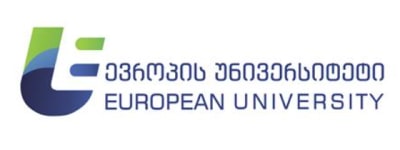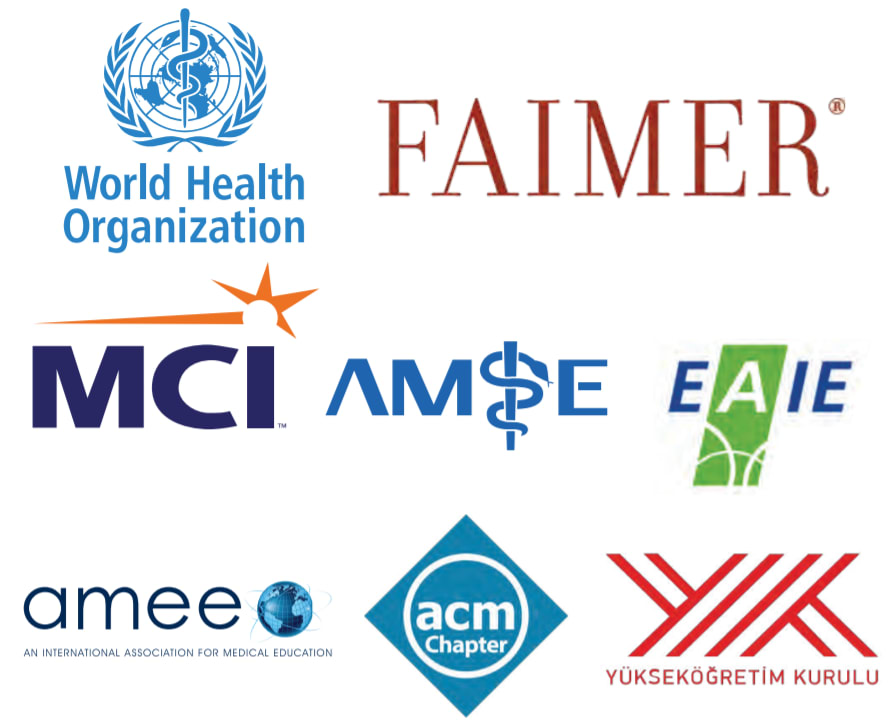
European University

Introduction
European University is an authorized higher education institution with the status of an educational university, which implements higher education programs in accordance with the rules established by law and issues a certificate of qualification recognized by the state.
By the decision of the Board of Authorization of Educational Institutions of January 21, 2011, University gained the status of a teaching university for a period of 5 years. By 2012, the university was implementing three educational programs: The Bachelor's Degree in Nursing, the Bachelor's Degree in Pharmacy, and the Master's Degree Program in Health Management. The marginal number of students was 246 students. At the end of 2013, the university received accreditation for the Bachelor's degree program in Finance and Banking, and in 2014-2017 - for the educational programs it currently pursues, including the English-language educational program of the graduate physician, which accounts for the largest share of foreign students. According to the decision of the Board of Authorization of Higher Education Institutions of January 18, 2016, European University has regained the status of an educational university for a period of 5 years, until 2021. According to the decision of the Board of Authorization of Higher Education Institutions dated December 13, 2016, the university has a marginal number of students with 1500 students, and according to the decision of the Board of Authorization of Higher Education Institutions of July 26, 2019, European University has set a threshold of 3,000 students.
4 faculties operate at European University:
- Faculty of Business and Technology
- Faculty of Law, Humanities and Social Sciences
- Faculty of Medicine
- Faculty of Veterinary Medicine
Within the framework of the mentioned faculties, the University implements 12 educational programs, which include educational programs of two levels of higher education (bachelor's, master's, one-level, and one-year teacher training).
European University has defined the following strategic priorities for the next seven years in accordance with its mission, vision, and values:
- Develop brand awareness and increase social responsibility;
- Development of all three levels of higher education programs;
- Improving the quality of planning and implementation of the learning process, wide introduction of innovative teaching-learning and assessment methods;
- Promotion and strengthening of scientific-research activities;
- Development of student services and environment;
- Organizational management of the University and resource development.
By 2025, European University, according to its vision application, is an open academic space that develops modern, well-equipped, comfortable, and adapted educational, scientific, and work infrastructure, maintains financial sustainability, attracts and effectively maintains highly qualified human resources, promotes their professional development, and encourages academic and student mobility through self-realization as well as active involvement in the process of internationalization.
The Faculty of Medicine
The Faculty of Medicine of the European University has been operating since 2014. The aim of the faculty is to ensure the training of students in the field of health care in terms of academic freedom and institutional autonomy.
The teaching process at the faculty is led by well-known and recognized specialists in the field, who have many years of medical and pedagogical experience. A variety of teaching and assessment methods provide the opportunity to master not only theoretical knowledge but also practical skills.
The Faculty of Medicine has signed cooperation agreements with about 60 clinics in Georgia, as well as with medical universities of different countries around the world. Professors and students of the Faculty of Medicine are members of various international scientific and professional associations. Based on all the mentioned above, apart from the practical training provided by the program, students have the opportunity to have clinical practice at various university clinics around the world, also to get involved in ongoing research projects at the faculty and participate in local and international scientific events. The student scientific journal "Biomedical and Core Clinical Research Practice" has been published since 2020.
There is a simulation center at the faculty, where clinical/sectoral skills are taught and assessed through modern medical technologies, mannequins in a simulated clinical environment.
The faculty conducts:
- Medical Doctor program MD in the English language
- Dental Medicine program in the English language
- Dental Medicine program in the Georgian language
The Research Institute of Medicine has been established at the faculty, which operates on the basis of the National Center for Tuberculosis and Lung Diseases. In addition to participating in local and international science grant projects, the Institute publishes a scientific journal - "Journal of Biomedicine and Medical Sciences".
We are not limited to simply teaching you medicine. We offer you an unforgettable journey through the micro and macro worlds of the human body, using modern medical literature, multimedia means, and medical simulators. We welcome you to major clinics where you'll be able to fully experience a realistic medical environment and help solve real tasks and use techniques that will later be crucial for conducting independent procedures in your future specialty.
Campus Features
- Modern technological base, varied library, and necessary appliances for respective programs;
- Laboratories;
- Well-equipped rooms;
- Modernized and high-level simulation rooms.
Why study at the European University?
European University is located in Tbilisi, the beautiful and safe capital of Georgia, which hosts about nine thousand international students, most of them studying in medical programs. Tbilisi is an old city with a 1500-year-old history and magnificent old buildings, relatively cheap food and accommodation, and most importantly, very safe as the rest of Georgia.
Dorms
We also offer dorms for our students. The dorms are located in a safe and ecologically friendly area near the embassy of the USA to Georgia. The dormitory includes 4700 square meters of space with a housing capacity of 250 students. Each furnished and well-equipped room has a bedroom for two students with free Wi-Fi, air conditioning, central heating, and a private bathroom. Some common areas include a cafeteria and gym on the ground floor. Professional residence life staff ensures the maintenance and safety of the dorms.
Gallery
Admissions
International Admissions
We try to make the admission process as flexible as possible for students applying to the European University from outside of Georgia.
Language requirement
Prospective international students pass a distance English exam. It makes the process cost-efficient for students who are able to get qualified for the program from their homes. The exam includes a speaking and writing part.
Required documents submitted via the application
While filling in the application form given below an applicant must attach the following documents to complete the application.
- Notarized copy of the citizenship document.
- Statement of a person with no citizenship should be enclosed by a copy of the residence card instead of the document certifying the citizenship.
- A Notarized copy of the document certifying full general education or its equivalent received in a foreign country.
- Photo 3X4.
How to apply?
Fill in the Application Form of European University (requires a Gmail account) which contains detailed and step-by-step instructions regarding filling in it. After filling in the application, the student recruitment and admissions manager will review the documents and the commission will conduct an online interview for the purpose to determine the eligibility of the applicant to the program. The next step is to submit the candidates' documents to the National Center for Educational Quality Enhancement for recognition and to send them to the Ministry of Education, Science, Culture, and Sport of Georgia for the purpose of obtaining the right to study at the University.
After obtaining the right to study, an agreement is signed with the applicant, after which the applicant pays the tuition fee.
After the full documentation is submitted, the applicant will be admitted to the European University and a visa is issued.
Visa Requirements
As an international student, you can study and live in Georgia if you are a proper visa holder. Foreigners coming to Georgia for long-term study purposes are issued the immigration visa (D3 category) with the term of 90 calendar days and multi-entry rights. Ministry of Foreign Affairs of Georgia, diplomatic representation of Georgia abroad, and the consular department make the decision about issuing the D category visa within the period of 30 calendar days after submitting the visa application.
- Electronically filled-in and signed visa application;
- Travel document/passport;
- Receipt verifying the payment of the consular fee;
- Photo;
- Documents verifying the purpose of travel in Georgia;
- Document verifying enrollment into an authorized educational institution;
- Document verifying the existence of sufficient funds during the desirable travel period;
- Document verifying the existence of the place of residence;
- Travel and health insurance;
- Document verifying the payment of the fine in case the foreigner was imposed the fine for staying in Georgia illegally;
- In case the document is submitted to the visa issuing body via the representatives, it is necessary to have the document verifying the right of representation.
For more information on visa regulations, please visit the website of the consular services of the Ministry of Foreign Affairs of Georgia.
Rankings
International Recognition
The Faculty of Medicine of European University has already made a name for itself on Georgian and foreign market and is recognized by the World Health Organization (WHO) and Foundation for Advancement of International Medical Education and Research (FAIMER). In addition, European University is represented in the World Directory of Medical Schools. The faculty is also recognized by the Medical Council (MCI) of India and the Council of Higher Education of Turkey (YOK). European University is a member of the Association for Medical Education in Europe (AMEE), Association of Medical School in Europe (AMSE), Jordan, and Germany.

Locations
- Tbilisi
Administrative Building Tbilisi, 0141, Guramishvili Avenue 76, , Tbilisi
- Tbilisi
The Building of the Faculty of Medicine Tbilisi, 0189, Sarajishvili Street 17, , Tbilisi


